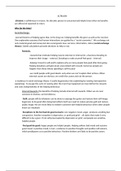Class notes
SOCIAL PSYC - Chapter 8
Notes from Textbook: Myers, D., Spencer, S., & Jordan, C., Smith, S, & Spencer, S. (2018) Social Psychology (7th Canadian Edition). McGraw-Hill Ryerson. Social Psychology - PSYC 2120 Comprehensive Chapter Notes
[Show more]



